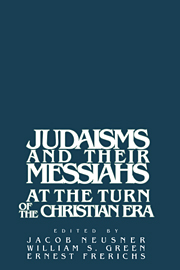Book contents
- Frontmatter
- Contents
- Preface
- List of Contributors
- 1 Introduction: Messiah in Judaism: Rethinking the Question
- 2 Wisdom Makes a Difference: Alternatives to “Messianic” Configurations
- 3 Salvation without and with a Messiah: Developing Beliefs in Writings Ascribed to Enoch
- 4 How the Authors of 1 and 2 Maccabees Treated the “Messianic” Promises
- 5 Messianism in the Maccabean Period
- 6 Waiting for the Messiah: The Spiritual Universe of the Qumran Covenanters
- 7 Philo and Messiah
- 8 Messiah and Gospel
- 9 Christology in Mark's Gospel
- 10 The Question of the Messiah in 4 Ezra
- 11 From Jewish Messianology to Christian Christology: Some Caveats and Perspectives
- 12 Mishnah and Messiah
- General Index
- Index to Biblical and Hermeneutical Texts
8 - Messiah and Gospel
Published online by Cambridge University Press: 08 January 2010
- Frontmatter
- Contents
- Preface
- List of Contributors
- 1 Introduction: Messiah in Judaism: Rethinking the Question
- 2 Wisdom Makes a Difference: Alternatives to “Messianic” Configurations
- 3 Salvation without and with a Messiah: Developing Beliefs in Writings Ascribed to Enoch
- 4 How the Authors of 1 and 2 Maccabees Treated the “Messianic” Promises
- 5 Messianism in the Maccabean Period
- 6 Waiting for the Messiah: The Spiritual Universe of the Qumran Covenanters
- 7 Philo and Messiah
- 8 Messiah and Gospel
- 9 Christology in Mark's Gospel
- 10 The Question of the Messiah in 4 Ezra
- 11 From Jewish Messianology to Christian Christology: Some Caveats and Perspectives
- 12 Mishnah and Messiah
- General Index
- Index to Biblical and Hermeneutical Texts
Summary
Whoever attempts to survey early Christian belief that Jesus of Nazareth was the Messiah of Israel is immediately confronted by a well known but nevertheless major problem. That is the problem of the translation of the Christian proclamation from that of a Palestinian Jewish sectarian group to that of a broader Greco-Roman religious movement, not in intention sectarian, which aimed to appeal to the gentile world at least as much as it did to the Jewish world of the Diaspora. The issue is problematic because, except for a very few isolated words and phrases, the oldest written sources of the Christian movement already reflect the transition. Virtually all efforts to describe the process of the transition are theoretical reconstructions. What we can document most directly are the reflections of either Hellenistic Jewish authors such as Paul or gentile Christian writers such as Luke. The limitations of this situation are obvious. Messianism is essentially a product of Jewish religion, with its roots, if not its most explicit articulation, deeply embedded in the literature of Israel. Our general question must involve this inquiry: How do we recognize the older messianic aspirations in the literature of a movement that expresses itself almost exclusively in Greek and more often than not in Greek categories of thought?
The problem is not merely one of language, though that dimension is not inconsiderable. It has to do equally with categories and patterns of thought.
- Type
- Chapter
- Information
- Judaisms and their Messiahs at the Turn of the Christian Era , pp. 169 - 186Publisher: Cambridge University PressPrint publication year: 1988
- 1
- Cited by



